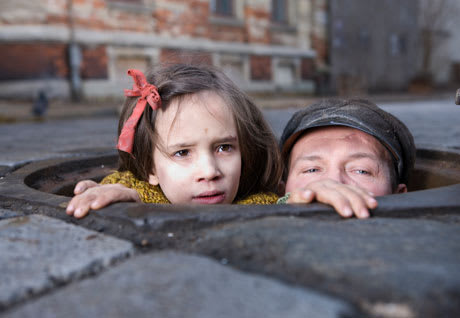Agnieszka Holland has made films about the survival of Jews (Europa, Europa) and the survival of children (The Secret Garden) before, and In Darkness combines them in a gritty, searing portrayal of Polish Jews hidden by a prejudice-cum-sympathetic Catholic in the Lvov sewers for 14 months during the holocaust.
In a complex narrative where Jews, Poles and Germans alike incite both pathos and revulsion, we follow the story of Socha (Robert Wieckiewicz), a Lvov sewer worker who, although anti-Semitic, hides a handful of Jews in the sewers in exchange for a monthly stipend. But as suspicions amongst his superiors rise, and the war takes a sour turn across Poland, Socha's family and life become targets.
Director Holland doesn't shy away from gross, brutal acts of humanity, where the audience dares not look away from a dozen naked, screaming women being hunted through a forest, or a single woman giving birth by hook or by crook amongst the rats and disease of the sewers. So much of this film takes place underground, and in the most horrific of circumstances that, when there are brief sunlit scenes, our eyes never adjust to the light.
Holland has created an archaeology of invented histories and half-imagined narratives pasted together into peculiar collage with a glue of superb acting, glimmers of hope and an unfortunate string of didacticism ("As if we need God to punish each other" flashes across the screen before the end credits roll).
There isn't anything particularly new or timely about the story, as WWII will always be the go-to event to mine stories from, but the performances by Benno Fürmann and Agnieszka Grochowska specifically, who play Jews falling in love amongst the sewer waste, is particularly poignant.
Pay close attention to the running visual notes on vermin (Jews are killed because they're "vermin," but while hiding in the sewers, the Jews are literally killing vermin to survive), which illuminates how whilst in the most inhumane of conditions, people will do almost anything just to feel human again.
(Mongrel Media)In a complex narrative where Jews, Poles and Germans alike incite both pathos and revulsion, we follow the story of Socha (Robert Wieckiewicz), a Lvov sewer worker who, although anti-Semitic, hides a handful of Jews in the sewers in exchange for a monthly stipend. But as suspicions amongst his superiors rise, and the war takes a sour turn across Poland, Socha's family and life become targets.
Director Holland doesn't shy away from gross, brutal acts of humanity, where the audience dares not look away from a dozen naked, screaming women being hunted through a forest, or a single woman giving birth by hook or by crook amongst the rats and disease of the sewers. So much of this film takes place underground, and in the most horrific of circumstances that, when there are brief sunlit scenes, our eyes never adjust to the light.
Holland has created an archaeology of invented histories and half-imagined narratives pasted together into peculiar collage with a glue of superb acting, glimmers of hope and an unfortunate string of didacticism ("As if we need God to punish each other" flashes across the screen before the end credits roll).
There isn't anything particularly new or timely about the story, as WWII will always be the go-to event to mine stories from, but the performances by Benno Fürmann and Agnieszka Grochowska specifically, who play Jews falling in love amongst the sewer waste, is particularly poignant.
Pay close attention to the running visual notes on vermin (Jews are killed because they're "vermin," but while hiding in the sewers, the Jews are literally killing vermin to survive), which illuminates how whilst in the most inhumane of conditions, people will do almost anything just to feel human again.
